LATESTS! Long-COVID-19 News: Study Shows That SARS-CoV-2 Brings About Long-Term Human Gene Changes Explaining Long-Haul COVID-19 Symptoms
Source: Long-COVID-19 News Apr 28, 2021 4 years, 9 months, 2 weeks, 4 days, 8 hours ago
Long-COVID-19 News: A new cell study conducted by researchers from Texas Tech University Health Sciences Center has alarmingly confirmed that SARS-CoV-2 spike protein can bring about long-term gene expression changes in human beings.

The emerged study findings could help explain why some COVID-19 patients ie referred to as COVID long-haulers experience symptoms such as shortness of breath and dizziness long after clearing the infection.
The findings will have yet to be submitted for publication but will be presented online during the coming American Society for Biochemistry and Molecular Biology annual meeting at the virtual Experimental Biology (EB) 2021 meeting, to be held April 27-30.(CEB 2021)
https://www.eventscribe.net/2021/EB2021/index.asp?presTarget=1640424
The SARS-CoV-2 coronavirus that causes COVID-19, is covered in tiny spike proteins. During infection, the spike proteins bind with receptors on cells in our body, starting a process that allows the virus to release its genetic material into the inside of the healthy cell.
Dr Nicholas Evans, a master's student in the laboratory of Dr Sharilyn Almodovar, Ph.D., at the Texas Tech University Health Sciences Center told Thailand Medical News, "We found that exposure to the SARS-CoV-2 spike protein alone was enough to change baseline gene expression in airway cells. This suggests that symptoms seen in patients may initially result from the spike protein interacting with the cells directly."
Typically culturing human airway cells requires specific conditions that allow cells to mature into the differentiated cells that would be found in the airway.
The study team optimized a previously developed culturing approach known as the air-liquid interface technique so that it would more closely simulate the physiological conditions found in the lung airway. This involved exposing cells to air and then giving them time to mature into airway cells.
The team found that cultured human airway cells exposed to both low and high concentrations of purified spike protein showed differences in gene expression that remained even after the cells recovered from the exposure. The top genes included ones related to inflammatory response.
Dr Evans said, "Our work helps to elucidate changes occurring in patients on the genetic level, which could eventually provide insight into which treatments would work best for specific patients.”
The study team also compared their cultured human airway cells to studies from others where cells were collected from patients with COVID-19 infection.
The team were able to confirm that the optimized cell culture approach reflected what occurs in patients, making it useful for future translational studies.
The study team plans to use the new approach to better understand how long the genetic changes last and the potential long-term consequences of these changes in relation to long-haul COVID-19 cases.
Further investigations are also underway to d
iscover how exactly the SARS-CoV-2 coronavirus is causing these gene changes. It is suspected that the SARS-CoV-2 coronavirus also produces a variety of viral proteins during replication that are not involved in creating copies of itself but rather to sabotage the host in a variety of ways.
The study findings could also have implications about the usage of the spike proteins and viral particles in vaccines as studies are warranted to see if any of these can also cause the same changes in gene expression.
Please donate to help support our site and all our initiatives. https://www.thailandmedical.news/p/sponsorship
For more on the latest
Long COVID-19 News, keep on logging to Thailand Medical News.
